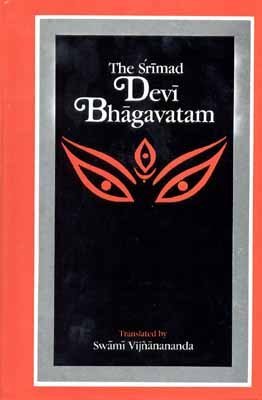The Devi Bhagavata Purana
by Swami Vijñanananda | 1921 | 545,801 words | ISBN-10: 8121505917 | ISBN-13: 9788121505918
The English translation of the Devi Bhagavata Purana. This Sanskrit work describes the Devi (Divine), the Goddess, as the foundation of the world and as identical with Brahman, the Supreme Being. The Devi Bhagavata Purana is one of the most important works in Shaktism, a branch of Hinduism focusing on the veneration of the divine feminine, along w...
Chapter 1 - On the story of Svāyambhuva Manu
1-6. Nārada said :-- O Nārāyaṇa! O Thou, the Supporter of this whole world! The Preserver of all! Thou hast described the glorious characters of the Devī, that take away all the sins. Kindly describe now to me the several forms that the Devī assumed in every Manvantara in this world as well as Her Divine Greatness. O Thou, full of mercy! Describe also how and by whom She was worshipped and praised; how She, so kind to the devotees, having been thus pleased, fulfilled their desires. I am very eager to hear these, the very best and blissful characters of the Devī.
Śrī Nārāyaṇa said :-- Hear, O Maharṣi! The glories and greatness of the Devī Bhagavatī leading to the devotion of the devotees, capable of giving all sorts of wealth and destroying all sins. From the navel lotus of Viṣṇu, the holder of the Cakra (discus), was born Brahmā, the Creator of this universe, the great Energetic One, and the Grand Sire of all the worlds.
7-14. The four faced Brahmā, on being born, produced from His mind Svāyambhuva Manu and his wife Śatarūpā, the embodiment of all virtues. For this very reason, Svāyambbuva Manu has been known as the mind-born son of Brahmā. Svāyambhuva Manu got from Brahmā the task to create and multiply; he made an earthen image of the Devī Bhagavatī, the Bestower of all fortunes, on the beach of the sanctifying Kṣīra Samudra (ocean of milk) and he engaged himself in worshipping Her and began to repeat the principal mystic mantra of Vāgbhava (the Deity of Speech). Thus engaged in worship, Svāyambhuva Manu conquered by and by his breath and food and observed Yama, Niyama and other vows and became lean and thin. For one hundred years he remained standing always on one leg and became successful in controlling his six passions lust, anger, etc. He meditated on the feet of that Ādyā Śakti (the Primordial Śakti) so much that he became inert like a vegetable or mineral matter.
By his Tapas the Devī, the World Mother appeared before him and said :-- “O King! Ask divine boons from Me.” Hearing these joyous words, the King wanted his long cherished and heart-felt boon, so very rare to the Devas.
15-22. Manu said :-- O Large eyed Devī! Victory to Thee, residing in the hearts of all! O Thou honoured, worshipped! O Thou! the Upholdress of the world! O Thou, the Auspicious of all auspicious!
By Thy Gracious Look, it is that the Lotus born has been able to create the worlds; Viṣṇu is perserving and Rudra Deva is destroying in a minute. By Thy command it is that Indra, the Lord of Śacī, has got the charge of controlling the three Lokas; and Yama, the Lord of the departed, is awarding fruits and punishing according, to their merits or demerits, the deceased ones. O Mother! By Thy Grace, Varuṇa, the holder of the noose, has become the lord of all aquatic creatures and is preserving them; and Kuvera, the lord of the Yakṣas, has become the lord of wealth. Agni (fire), Nairrit, Vāyu (wind), Īśāna and Ananta Deva are Thy parts and have grown by Thy power. Then, O Devī! If Thou desirest to grant me my desired boon, then, O Thou! the Auspicious One! Let all the great obstacles to my work of procreating in this universe and increasing my dominions die away. And if anybody worships this great Vāgbhava Mantra or anybody hears with devotion this history or makes others hear this, they all shall be crowned with success and enjoyment and Mukti be easy to them.
23-24. Specially they would get the power to remember their past lives, acquire eloquence in speaking, all round beauty, success in obtaining knowledge, success in their deeds and especially in the increase of their posterity and children. O Bhagavatī! This is what I want most.
Here ends the First Chapter of the Tenth Book on the story of Svāyambhuva Manu in the Mahāpurāṇam Śrī Mad Devī Bhāgavatam of 18,000 verses by Maharṣi Veda Vyāsa.
